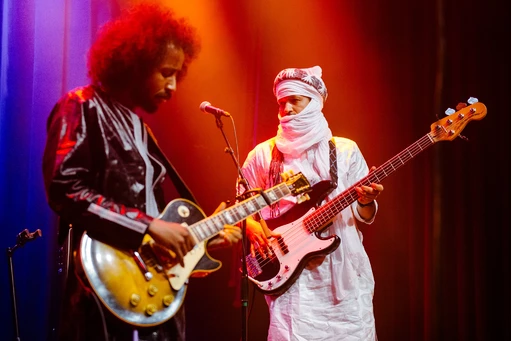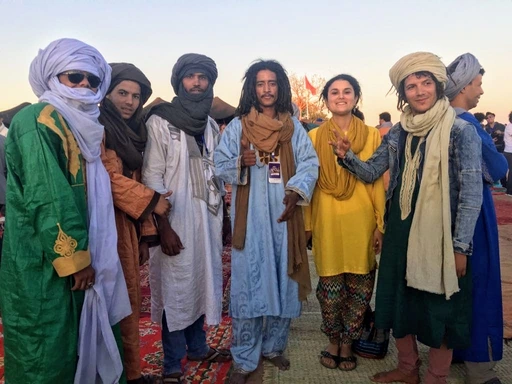
On the coldest day of 2021, musician and writer Samira Dainan went to Poppodium Duycker in Hoofddorp to meet with Ousmane Ag Mossa, the bandleader of Tamikrest. Named the new legend of Tuareg music, Ousmane speaks on what it means to write music in the solitude of the Sahara desert. In this podcast, he speaks on the power and the meaning of his music, and how each song breaths a whole life-world and history.
Samira's Blues tribute to Tamikrest: Fassous Tarahnet
Founded in 2006, in Kidal in Mali, Tamikrest call themselves ‘the children of Ibrahim’, after Ibrahim Ag al Habib, the founder of the leading Tuareg band Tinariwen. In spite of ongoing riots and regional conflicts, which have a gripping force on their lives since the independence of Mali, Tamikrest seeks to make music reflecting their Tamasheq poetry and culture: “A desert hosts us, a language unites us, a culture binds us.”
Tamikrest - Tapsakin - Rad Fyah Studio (on the road) Live Session
In this podcast, I dive into the story of The Blues of The Desert, and that of Kel Tamasheq, the people who speak the Tamasheq languages. In the west, this group is often referred to as Tuareg, a name that arose during the French occupation. The Tuareg are a semi-nomadic people mainly living in the Sahara in Northern Mali and across its borders in Niger, Burkina Faso, Algeria and Libya. They are descendants of Berbers and Imazighen of North Africa who speak the Berber languages, also known as the Amazigh languages. The Tuareg people practice Sunni Islam, often in syncretic form, and incorporate traditional beliefs. They have a very strong music culture, and in the last twenty years Tuareg bands are becoming increasingly popular in the west.
Many of the Tuareg people have been displaced from their native land and are living in refugee camps near the Algerian border and in Northern Mali. More than 30 years ago, the legendary group Tinariwen began to play their own music style, which is often referred to as 'guitar poetry' or 'assouf'. The language of this music is Tamasheq and its prime emotion is assouf, which means loss, longing, homesickness or "the pain that is not physical". It's a word that encompasses everything the Tuareg once had, but have since lost. No word is more common in modern Tuareg music and poetry.
Many of the Tuareg people have been displaced from their native land and are living in refugee camps near the Algerian border and in Northern Mali. More than 30 years ago, the legendary group Tinariwen began to play their own music style, which is often referred to as 'guitar poetry' or 'assouf'. The language of this music is Tamasheq and its prime emotion is assouf, which means loss, longing, homesickness or "the pain that is not physical". It's a word that encompasses everything the Tuareg once had, but have since lost. No word is more common in modern Tuareg music and poetry.
Tamikrest - Imanin bas zihoun
The first time I heard Tinariwen play at Paradiso in Amsterdam, I felt very connected to their music and culture, and that was more than ten years ago. Maybe because they have such strong roots in North Africa, but also because they play music that is close to the Blues. Later on I discovered other Tuareg bands, as I traveled to the desert of Morocco where I was invited to play in Taragalte, a big festival of Sahara music.
In the desert I found that my own assouf, or homesickness, was understood by the great silence but also by the generosity of the people. The way the people lived in such hard circumstances, while still so free at heart, and dignified, inspired me to write new music.
In the desert I found that my own assouf, or homesickness, was understood by the great silence but also by the generosity of the people. The way the people lived in such hard circumstances, while still so free at heart, and dignified, inspired me to write new music.
Tamikrest: Azawad
Back in Amsterdam, I formed my band Samira's Blues. I found great companions in the guitarist Bas Gaakeer and bass player Hassan Ait-Moumad. At the end of 2018, we had our E.P. release in Paradiso in Amsterdam and we even became a supporting act for two major Tuareg groups Imarhan and Tamikrest in the Netherlands.

Tamikrest - Amidinin Tad Adouniya
In this podcast I hope to find out why this music from the Sahara became so popular in the live scene in the west, and what makes their message of emancipation so powerful.
They asked me who I am and what I want
I replied that we are history and change. We are the volcano that comes from afar.
We are the Kel Tamasheq people, become servant of servants
We are the ones who have suffered oppression for years
We are the people who hope for better days
I was asked who I am, I was asked what I wanted
I didn't look for an answer, I just closed my eyes and let our experiences speak.
I'm a volcano of distress and oppression and it's up to me to choose my path
I am that rebellious spirit born of cruelty. Let that dupe, ignorant know that I'll never put myself down
These are the days that choose fate, and I'm at the heart of that fate
I am the one whose time thought it had the consent to impose its injustice and kill my youth.
Never say my cause is lost, my cause has just begun
I am my legacy, my song and my tears
I am myself, I am behind the veil
I am a volcano of sadness that will destroy and reveal the lie in its path
(Tamikrest - As Sastnan Hidjan)
They asked me who I am and what I want
I replied that we are history and change. We are the volcano that comes from afar.
We are the Kel Tamasheq people, become servant of servants
We are the ones who have suffered oppression for years
We are the people who hope for better days
I was asked who I am, I was asked what I wanted
I didn't look for an answer, I just closed my eyes and let our experiences speak.
I'm a volcano of distress and oppression and it's up to me to choose my path
I am that rebellious spirit born of cruelty. Let that dupe, ignorant know that I'll never put myself down
These are the days that choose fate, and I'm at the heart of that fate
I am the one whose time thought it had the consent to impose its injustice and kill my youth.
Never say my cause is lost, my cause has just begun
I am my legacy, my song and my tears
I am myself, I am behind the veil
I am a volcano of sadness that will destroy and reveal the lie in its path
(Tamikrest - As Sastnan Hidjan)
The selection of music that was featured in this episode has been carefully curated by Samira Dainan.
With special thanks to Ousmane Ag Mossa for the interview.
Tamikrest is currently touring across 12 countries and has 3 upcoming concerts in The Netherlands:
More info: www.tamikrest.net
With special thanks to Ousmane Ag Mossa for the interview.
Tamikrest is currently touring across 12 countries and has 3 upcoming concerts in The Netherlands:
26th May 2022, Luxor - Arnhem
27th May 2022, Podium De Vorstin - Hilversum
29th May 2022, De Effenaar - Eindhoven
More info: www.tamikrest.net
This podcast is part of the series 'music and emancipation', a programme around the emancipatory power of music in artistic practices, which started in 2019 at Conservatorium Enschede. Listen to the first podcast made by Samira Dainan.
related content
people – 21 dec. 2021
Samira Dainan
podcast Rana Ghavami – 23 jun. 2020

